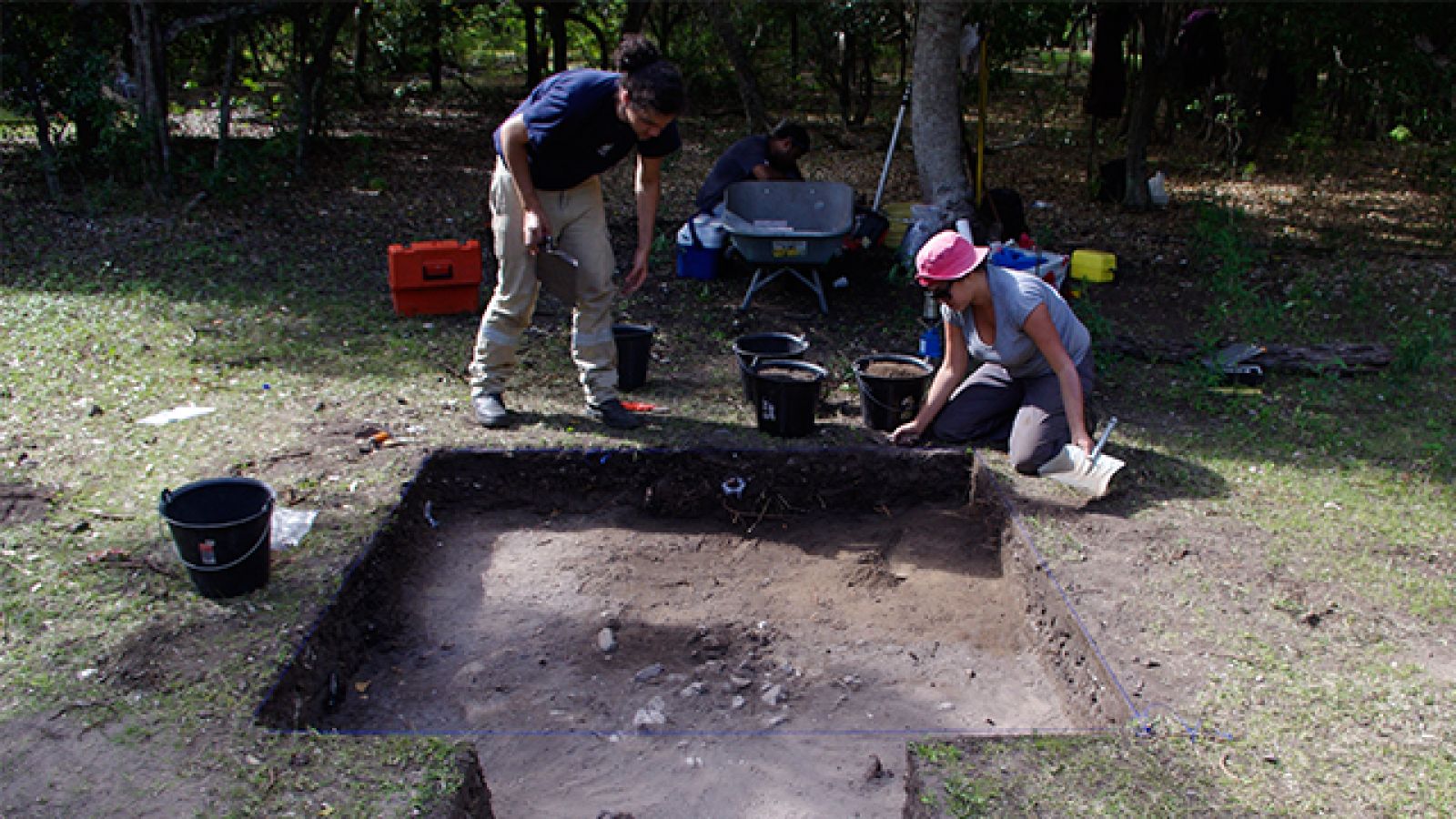ANU Pacific archaeologists bridge the Francophone-Anglophone divide

Early career researchers from the Institute of Archaeology of New Caledonia and the Pacific doing fieldwork in New Caledonia. Image: Dr Emilie Dotte-Sarout
Dr Emilie Dotte-Sarout is a Francophone Pacific archaeologist working in an Anglophone environment.
Now a Postdoctoral Research Fellow with the CBAP team in the ANU School of Archaeology and Anthropology, she grew up in New Caledonia and straddled the language divide during her PhD with co-supervisors at the ANU and the Sorbonne in France.
Emilie realised that people coming from the Pacific Islands to study in Australia were almost exclusively coming from the Anglophone islands.
“There was almost no representation from the Pacific islands where people speak French,” she says.
“I thought it was a bit sad that there was this divide. I’ve observed that for the students, but it’s true of the community as well.”
Emilie is now working to bring together Pacific archaeologists working in the two language groups with a workshop on 24 November.
“The idea of the workshop is to have not just Francophones, but early career practitioners, present their work,” Emilie explains.
“This will give them the opportunity to present their work in English in Australia at the ANU, where there’s one of the biggest communities of people working in the Pacific.”
The emphasis on early career Francophone archaeologists is a deliberate choice. Earlier generations of Pacific archaeologists, including from the ANU, have managed to form collaborations. Many of them speak and read both French and English.
“Early career Francophone archaeologists need to have their work recognised and presented to the academic community,” Emilie says.
“They don’t have a lot of opportunities to have their work presented to the Anglophone community, in terms of publication and participation in conferences, because they don’t always have easy access to funding.”
The communication frontier has created gaps in Pacific archaeology research as well as some duplication. The issue is deepening with the rise of young, mostly monolingual Anglophone researchers while young Francophone researchers are struggling to publish in English.
“From my experience, the new generation of people working and doing Pacific studies don’t read much in French,” Emilie says.
In giving an example, Emilie referenced her expertise in archaeobotany – the examination of botanical remains from archaeological deposits.
“There has been a lot of work done in Europe on the methods on this, but people in the Pacific are not always aware of this,” she says.
“They start to ask us about the methods, but many of these questions have already been addressed in the French, Spanish, German or Italian literature.”
Dr Guillaume Molle, a lecturer in Pacific archaeology at the ANU, will be presenting at the workshop. He thinks students and researchers in other fields would benefit from learning second and third languages.
“When you do anthropology and human sciences in general, it’s fundamental to realise that there are people working and living in the Pacific islands who speak other languages – not only French but indigenous languages as well,” he says.
Guillaume, who was born and grew up in France, joined the School of Archaeology and Anthropology earlier this year. He wanted to work not only with colleagues in his home country, but with peers in Australia and the United States.
“There are some specific Francophone traditions of research,” Guillaume says.
“For instance, specific methods and concepts have been developed for studying stone tools. People now refer to it as the French tradition of stone tools analysis.
“Within the Pacific Islands, you have people moving all the time through globalisation. I think it’s important to bring that to research as well, in terms of learning each other’s traditions of research.”
He adds that a longer term goal of the workshop is stimulate discussions and create more opportunities.
“We want to create new bridges in the future; collaborations across the Francophone and Anglophone spheres.”
Emilie agrees: “As a continuity of this, I really wanted to have the newer generation of Francophone researchers come here and put these connections in place with the Anglophone and ANU community.”
“Rather than just looking at the past, we’re also looking at the future.”
Putting New Francophone Archaeology on the (Pacific) Map: a workshop presenting the work of Francophone ECRs in Archéologie Océanienne will run on 24 November and is open to the public. Further details.